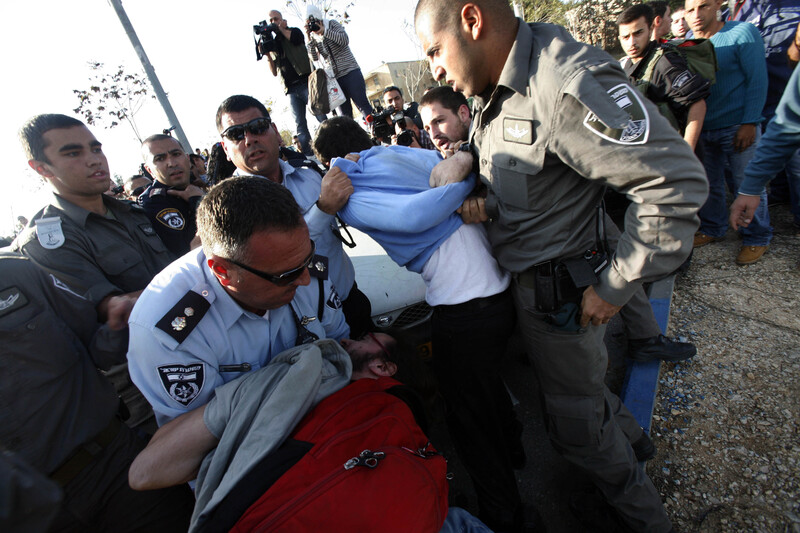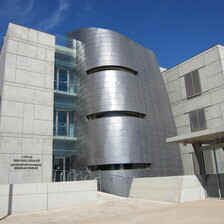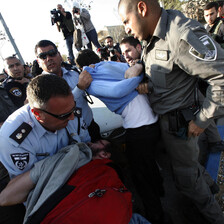The Electronic Intifada Haifa 18 March 2013

Israeli forces arrest protesters during a solidarity demonstration with Gaza, 20 November 2012.
APA imagesThe repression of the Palestinian student movement at the Hebrew University in Jerusalem has intensified since Israel’s attacks on Gaza last November, as four Palestinian students were arrested in the past month.
On 6 March, Israeli police brutally attacked and arrested three Palestinian students shortly after a peaceful demonstration in support of the Palestinian prisoners’ hunger strikes which was held at the campus’ entrance.
Palestinian students at the university have been organizing weekly demonstrations in support of Palestinian political prisoners on and just outside campus. The 6 March protest was larger than previous demonstrations, with a turnout of more than 70 students.
The arrests occurred 20 minutes after the end of the demonstration, when the students were near the entrance of the dorms. Two days later, another student, who is politically active, was called for an interrogation at an Israeli police station.
Crackdown
The recent crackdown on student organizers goes back to mid-November, when police attacked a peaceful demonstration held by Palestinian students against the assault on Gaza at the campus entrance, arresting three of them. A week later, police arrested one of the students for a second time, claiming that he did not turn up for additional questioning, although he was not officially notified.
Ali Jassar, one of the three students who were arrested earlier this month, described to The Electronic Intifada how he was beaten and arrested: “During the event a student told me that the policemen were pointing at me. Twenty minutes after the end of the event, while I was with another student on my way to the dorms, we were suddenly pushed from the back, then we became aware of the large number of policemen who were surrounding us. As a result of the violent attack I got bruises on my shoulder and on my back.”
A dramatic video posted on YouTube shows the chaotic scene during the arrests. The students are dragged by militarized forces and put into police cars as a crowd forms to protest and try to prevent the young men from being taken away.
Jassar said that this brutal treatment continued for the duration of his detention, as the policemen continued to harass and bully him and his friend all the way to a police station called Shalem.
“We felt that it became personal, the policemen kept mocking us even with the smallest things,” he said. “For example the temperature of the air conditioner in the police car was really high, Majd [another student] asked to lower it. In response the policeman turned it to the maximum. When we got out of the car, into the very cold weather outside, I felt ill and dizzy.
“Also, after long hours in the station we complained that we were hungry. The policemen’s reaction was to bring food and start eating in front of us.” After the investigations the students had to spend the night in the Russian Compound (a Jerusalem police station known to Palestinians as Moskobiyeh).
The three students who were arrested were accused of assaulting police officers, preventing a policeman from doing his job and disturbing public order. The prosecutors asked the judge to ban the students from campus for 30 days, bar them from taking part in any political activity, and impose a bond of 3,000 shekels ($815).
In court the police confessed that they didn’t ask the demonstrators to end their protest or announce that it was an illegal gathering, according to Jassar. Yet many students had pictures and videos proving the opposite. In the end, the students were released without any charge.
Following this chain of events, Haneen Zoabi, a Palestinian member of the Israeli Knesset, or parliament, sent a letter the president of the Hebrew University asking him to intervene to protect the students. Zoabi noted that the university’s constitution says the institution “shall be open to any person regardless of race, sex, religion, political or other opinion, national or social origin, property, birth or other status.” Zoabi emphasized that preventing discrimination is necessary to ensure the safety of students.
She also asked the president to investigate the way Palestinian students at the university are being treated and to listen directly to the students concerned.
Threatening phone call
Khalil Ghara claimed that his arrest is part of a pattern of political persecution of Palestinian campus activists.
“A week before my arrest, I received a phone call from the General Security Service,” Israel’s domestic spy agency, also known as the Shin Bet or Shabak, he explained. Threatening to arrest Ghara, an Israeli intelligence agent told him: “’Tomorrow you’ll be sitting here in the office; last time you were arrested you managed to escape, as you had a good lawyer.’”
At midnight on 25 February, four armed plainclothes policemen stormed Ghara’s dorm room, searching through his possessions for half an hour, seizing his laptop and a memory card along with the computer and camera of a friend who happened to be in his room. The police arrested Ghara without presenting him with an arrest warrant and released a day later, according to the website Arabs48.com.
Ghara was charged with incitement for describing an Arab officer serving in the Israeli police as a “traitor” on the website Facebook.
Alaa Mahajna, the student’s lawyer, has argued that no evidence was presented in court to justify Ghara’s arrest, according to Arabs48.com.
After Ghara’s arrest, Palestinian students at Hebrew University published a statement in which they claim that the police is not targeting Ghara alone, saying that his arrest is part of a campaign targeting the Palestinian student movement and Arab students at the university more generally.
The students state that the arrest is only a failed attempt to intimidate activists and an attempt to disrupt solidarity events at the university in support of the political prisoners’ struggle, pledging to continue their organizing in solidarity with hunger strikers.
Yara Sa’di is a postgraduate student and activist from Haifa.





